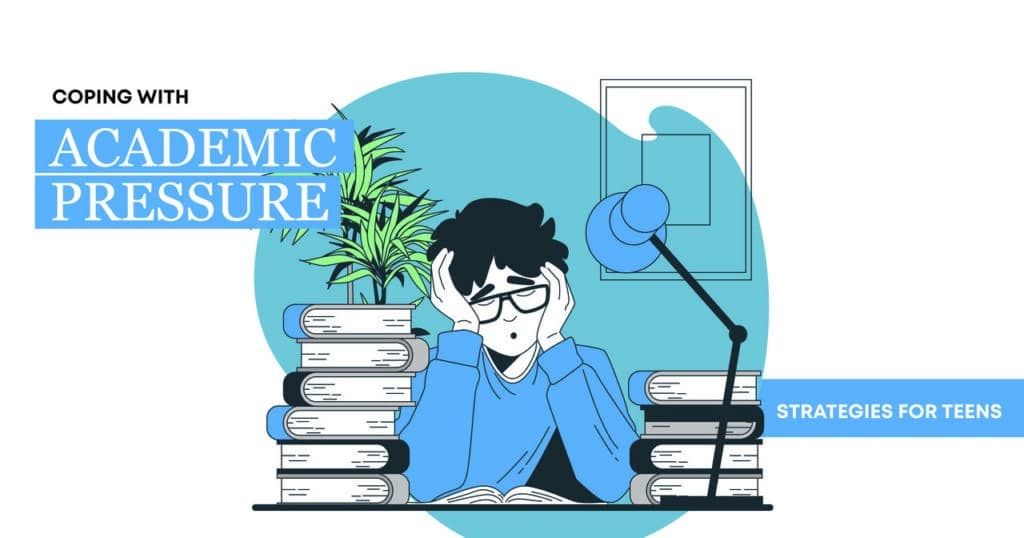The fact is, school life can get pretty exhausting at times. You have to juggle your homework, study for exams, or find some time to participate in extracurricular activities, the academic pressure can get suffocating.
It’s not a surprise for many teens to be stressed, anxious, or even burnt out about school. So here’s the good news: you don’t have to deal with it alone, and some strategies can be used to take the pressure in a much healthier way.
Essential Takeaways for Academic Pressure
- Balance is the key to managing academic pressure. How academics can gain a balance with hobbies, relaxation, and social life will avoid burnout and maintain mental well-being.
- Communication and support are important. Don’t be afraid to ask for help when things get too tense with the academics. Open communication with trusted adults or friends can make all the difference in managing stress.
- Time management and realistic goal setting lower stress. Good time management and setting achievable goals help you not get overwhelmed with schoolwork because you can keep on top of it. Breaking tasks into small steps and focusing on the progress is the key.
This is a discussion of academic pressure, why it’s such a big deal for teens today, and, more importantly, how you can cope with it effectively.
Understanding Academic Pressure in Teens
What Is Academic Pressure?
Academic stress is the feeling of stress or pressure one gets to perform well in school. This stress can come from many sources – your parents may expect you to achieve straight A’s, your teachers may push you hard to ace every test, or even you may put much pressure on yourself to be at the top in class. Add in extracurricular activities, social life, and the looming thought of college, and it’s no wonder that teens today are feeling the heat.
It creates a feeling of being overwhelmed, like no matter how you try, you’re always behind. And that’s not just in your head; academic pressure does affect mental and physical health, so we all need to learn how to manage it.
Why Are Teens Under More Pressure Today?
There is no doubt that contemporary teens are under increased scholarly pressures than at any time. But why? In all reality, the cutthroat battle to get accepted into college has never been more intense, and the bar for success is never-ending. It is not about ‘good grades alone; rather extras, volunteer work, leadership, and so much more’.
Social media, for instance, has been known to play a role. You’re browsing through Instagram or TikTok and seeing that your friends are achieving so much or winning these scholarships, and you may feel as though they are outperforming you even though you are doing your best. This sometimes constant comparison adds yet another level of academic pressure that teens already face.
Effect Academic Pressure Has on Teens’ Mental Health
Stress and Anxiety at School
Stress and anxiety are two of the most common side effects of academic pressure. Easy enough, since when you’re constantly worried about grades, tests, and deadlines, that stress is just going to stack up over time.
You can feel butterflies in the classroom, whether or not you feel prepared or worried you’re screwing everything up. And then there’s no relief at home because that stress and anxiety follow the student home, and it’s just really hard to focus on anything other than school.
Stress can depress your concentration, and then the situation worsens because it will be hard for you to get on top of things in school, thus multiplying the stress. It’s a vicious cycle that may lock you in.
Physical and Emotional Signs That You Are Under Academic Pressure
There is that saying that academic pressure has a lot to do with what is going on in your head, but it is also very much in your body, too. Here are some signs that academic stress might be affecting you:
- Headaches or Stomachaches. You’re probably feeling stressed if you suffer from frequent headaches or stomachaches.
- Trouble Sleeping. Are you awake at night, worried about school or not getting enough rest? It may be because of the weight on your shoulders in terms of academic pressure.
- Mood Swings or Irritability. Are you feeling more easily frustrated or emotional than you used to be? That may be a sign that you are under too much stress.
At some point, one feels overwhelmed or hopeless if the school seems like an unending mountain of work that he or she cannot climb; hence, learning to recognize this is a sign of burnout.
Long-term Effects of Academic Pressure
Left unchecked, the academic pressures can lead to bad long-term effects. Stress can also become a promoter, or in some cases the cause, of mental illness issues, including anxiety, depression, and even burnout. Your physical health is thrown off as well: your sleep patterns are lost, your immune system weakens, and, unhappily, a myriad of unhealthy coping mechanisms take their place.
Thus, learning how to cope with school pressure is so important. It’s not just about getting over the next test but protecting your long-term well-being.
Familiar Sources of Academic Pressure
Pressure from Parents and Teachers
In most cases, parents and teachers are concerned about your welfare, but sometimes high expectations just augment pressure. You would develop a sense of obligation toward meeting their expectations, or perhaps you are not up to them.
Perhaps it’s demanding that you receive straight A’s, or your teachers are compelling you to get good grades in all subjects. Their motives are usually good, but it is always important to let them know those expectations overwhelm you.
Self-Imposed Stress
Much of the stress a teen feels is self-imposed. You may set up conditions for amazingly high expectations because you want to succeed, get into a “good” college, or prove something to others.
This stress might sometimes be the hardest to endure since it’s closely associated with self-esteem. If your value in life is tied up with grades, then every not-so-desirable grade can attack your self-worth.
Comparison Through Social Media by Peers
Social media is another big cause of stress. Friends posting about their grades, college acceptance, or anything else can make one feel they are not meeting their expectations. It becomes very easy to compare oneself against someone else, even when everyone has undergone different journeys.
Time Management and Organization Skills for Dealing With Academic Pressure
- Organization. The one sure-shot way to deal with academics is to stay organized. With multiple assignments, tests, and extracurriculars, one can get overwhelmed if one is not organized.
- Use a planner or digital calendar. Write down every single deadline and every test. Knowing what’s coming up helps you plan for your days, weeks, and even months.
- Break tasks into smaller steps. Instead of thinking of a big project as one overwhelming thing, break it down into smaller, more manageable tasks.
- Prioritize assignments. If you have a lot on your plate, prioritize the most important work first, and don’t be afraid to ask teachers for extensions if you need them.
Develop Healthy Study Habits
This is an important area where study habits significantly influence how well you handle academic pressure. You will damage your mental and physical health if you cram at night before an exam or pull many all-nighters to finish assignments.
- Set up a study schedule. Allocate time each day for studying or working on assignments. Consistency is the key.
- Limit interruption. Switch off your phone, turn off notifications, and seek a quiet place to ignore the world and think without being interrupted.
- Active learning. Reading and marking or highlighting the notes should be done in active time to quiz yourself, teach the material to someone else, or even use flashcards.
Mindfulness and Relaxation Techniques
Attempt these techniques to manage stress. As soon as you start getting overwhelmed with work, try one of these techniques:
- Deep breathing. Sit back, close your eyes, and take a few slow, deep breaths. Inhale for four seconds, hold, and exhale for four seconds.
- Meditation. A few minutes of meditation can calm the mind and refocus energy.
- Take breaks. Stepping away from your work doesn’t hurt a bit. Take a short walk, listen to music, or relax.
Setting Realistic Goals
Balancing academic pressure should be combined with goal management. It is worth challenging yourself, but not to the point of becoming overwhelmed. Break down your bigger academic goals into smaller, achievable steps, and celebrate your progress.
Of course, you will make mistakes. No one is perfect, and setbacks are part of the learning process.
Talking to Someone to Feel Better
You should never be afraid of asking for help; that is the best thing that has ever happened to me. Whether talking to a parent, friend, teacher, or school counselor, opening up about how you feel helps sometimes. You just get your worries off your chest and feel a little lighter.
Balancing Academics With Life
The Importance of Hobbies and Extracurricular Activities
While academics are important, so is making time for hobbies or extracurricular activities that interest you. It may be playing a sport, learning a musical instrument, or volunteering in an activity of your choice. These activities will provide you with temporary relief from schoolwork, where you just sit back, relax, and forget about exams.
Balancing academics with things that you love can help reduce the pangs of stress and make you feel complete.
Finding Time for Friends and Family
Time spent with friends and loved ones is significant to your emotional well-being. Reach out to your support people in big or small ways when school seems too much of a burden. Do not isolate yourself-time yourself to spend some time with friends, plan for family getaways or just a time to discuss with someone you trust.
Sufficient Rest and Body Care
Sleeping, exercising, and healthy eating greatly affect how well you handle academic pressure. Well-rested and physically healthy, you will find it easier to focus, retain information, and manage stress.
- Sleep Routine. Try to go to bed and wake up simultaneously every day, even on weekends.
- Be active. Get regular exercise. It will boost your mood, reduce stress, and keep you healthy. Even 20 minutes of walking will help.
- Eat balanced meals. Do not rely on junk food or much coffee to get over it during stressful times. You will need the energy to give your workload the attention it deserves with balanced meals.
- Helping Teens With Academic Pressure. How Parents and Teachers Can Assist
Open Communication
One of the most important things you can do is help create a climate where teens feel it’s okay to discuss their academic stress with you. Open communication and active listening are essential when your teen shares his or her concerns.
Redefine What Success Means
The definition of success is not about having straight As in school and being one of the best in class but effort, progress, and personal growth. You must remind them that learning is a journey, not a destination, and just fine if they are imperfect.
Establish a Supportive and Flexible Learning Environment
In addition to parents, teachers can also play a role in the area of managing pressure on academics in teenagers: make a student-friendly learning environment, adjust deadlines as much as possible, provide extra support or tutoring to weak students, and foster a classroom culture where mistakes are seen as chances to learn rather than failures.
Dealing With Test Anxiety
Understanding Test Anxiety
Test anxiety has been afflicting many teenagers. It is the nervousness, fearfulness, or even panic one feels before or during a test. You may feel queasy, have difficulty concentrating, or even forget everything you learned.
Preparation for Tests
One of the best ways to countertest anxiety is by preparing well beforehand. Do not cram the night before when, for instance, you are starting to study. Instead, divide your study sessions into small sessions spread over days.
- Make use of past papers. Practicing through past exams is one method that can help you become familiar with the format and also tends to reduce anxiety on the test day.
- Study in a group. Studying with friends becomes much more fun, and you retain that information better.
Manage Your Anxiety for the Day of the Test
Try being quiet and focused on test day. These are some tips to help you get over your anxiety:
- Plan to arrive early. Allow sufficient time to arrive at the test venue and settle in before the test begins.
- Deep breath. As soon as you start to feel anxious, take deep breaths to calm your nervous system.
- Be optimistic. You’re ready for this; whichever the outcome is, it’s just one test, not defining who you are.
Developing Resistance to School Stress
Drawing Lessons from Mistakes
Failure is a part of life, but even more than that, it is a part of learning. Do not view a bad grade or missed deadline as the world’s end. Instead, use it as a chance to learn and improve. What went wrong? What would I do differently next time? Resilience is accepting the unfair shake of life and bouncing back from setbacks stronger than ever.
Building Mental Resilience
Mental resilience provides the ability to manage stress healthily. Strengthen this skill by practicing gratitude, staying focused on positive self-talk, and being motivated when things get tough.
Celebrate Small Wins
Don’t forget the small celebration of victories. You finally finished that challenging assignment, improved your study habits, or even survived that tiring week. Acknowledge efforts and progress made.
Coping With Academic Pressure as a Teen
No one denies that managing pressure from academics is easy, but it can be managed with numerous strategies that keep things organized. Good study habits are necessary to help balance the aspects of life so that one minimizes stress and feels fully prepared for school and mental success. Remember, grades never define worth, nor does any grade define an individual, and asking for help is acceptable when needed.
Call to Action: Prioritize Mental Health Alongside Academics
The thing is, you need not face it. If one feels academic pressure getting too much to take, he needs to take a step back and prioritize his mental health. Some of the techniques we have discussed above to achieve this are setting realistic goals, taking some breaks, and talking to somebody for support. Share this article with friends who are probably going through the same hell. Remember, school is but one part of your life, your whole well-being counts, too.
FAQs
- What causes academic pressure in teens?
The sources of academic pressure for teens can be pretty diverse: parental expectations, teachers’ expectations, self-pressure, and so many others. External factors may also include pressure from what happens on social media, like college applications to being competitive.
- How can I manage academic pressure more effectively?
Effective management of academic pressure comes from sound time management, realistic goal setting, and sound healthy studying habits. Mindfulness practice, taking breaks, and seeking support from friends, family, or counselors are also considered healthy strategies.
- What are some signs that academic pressure is affecting my mental health?
Some of the common signs of academic pressure stress are not having proper sleep, frequent headaches or abdominal aches, mood swings, irritability, and getting overwhelmed. Prolonged academic stress can be a triggering factor for burnout, anxiety, and even depression.
- How can I balance academics with extracurricular activities and social life?
There should be a balance between academics and other life activities, which can be achieved through priorities and good time management. Plan your schedule ahead of time, break tasks into smaller steps, and ensure there is some time for hobbies, exercises, and social relationships with friends and family.
- How can parents and teachers help teens deal with academic pressure?




